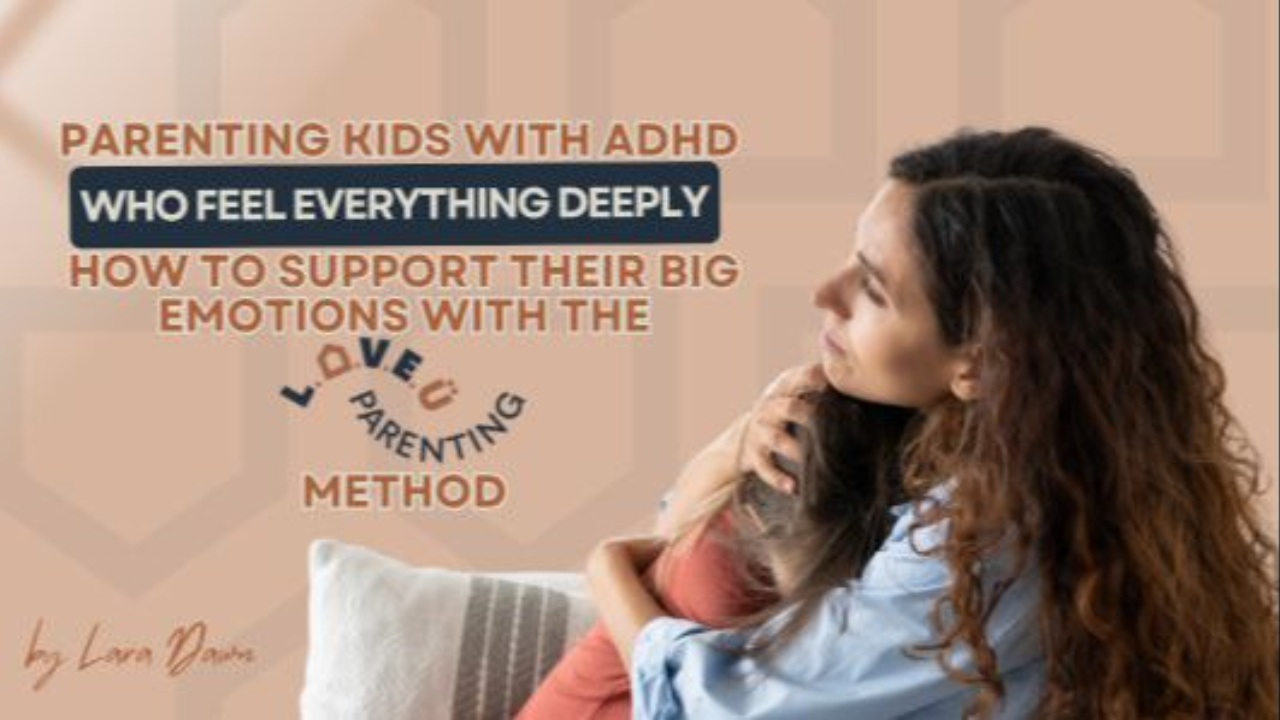
Parenting Kids With ADHD Who Feel Everything Deeply: How to Support Their Big Emotions With the LOVE Ü Parenting Method
Sep 22, 2025💗 Parenting gets easier—and far more joyful—when you understand your child’s ADHD brain and give them the kind of support it actually needs. Click here to join the LOVE Ü Parenting Classroom and discover how connection-based parenting can transform your days.
Why Kids With ADHD Feel Everything So Intensely
If it feels like your child goes from 0–100 in a heartbeat, you’re not imagining it. Children with ADHD often experience emotions more intensely and recover more slowly than their peers. This isn’t bad behaviour or poor character—it’s neurobiology.
Dr. Russell Barkley explains that ADHD isn’t just about attention; it’s also about emotional self-regulation:
“ADHD is as much a disorder of self-regulation as it is a disorder of attention.” — Dr. Russell Barkley
That means your child’s nervous system is more sensitive to triggers and stress hormones. They don’t yet have the internal brakes to slow down big feelings. What looks like defiance, yelling, or refusing to back down is often your child’s way of saying, “My brain is overwhelmed.”
The Three Parenting Energies
When our children’s emotions surge, it’s easy to slip into lecturing or trying to “fix” their behaviour. But that can escalate things even further. Instead, think of stepping into one of your three parenting energies:
-
Mama Bear — the one who learns strategies, sets boundaries, and advocates fiercely for her child.
-
Goddess — the softer, intuitive side that offers warmth, eye contact, and safety.
-
Captain — the visionary leader who keeps the long-term picture in mind, steering the ship even when the waves are high.
Moving between these energies helps you co-regulate your child and stay steady yourself.
The LOVE Ü Parenting Method for Big Emotions
Ü – YOU First: Before responding, ground yourself. A hand on your heart, a slow exhale, a quick mantra... these tiny actions bring your nervous system back into regulation so you’re not pulled into the storm.
L – Listen Deeply: Under the outburst there’s always a need. Reflect it back: “You’re really frustrated. You wanted that to go differently.” This isn’t about agreeing; it’s about showing your child they’re heard, which lowers stress hormones in the brain.
O – Oxytocin & Other Feel-Good Neurochemicals: Short bursts of play, laughter, and touch release oxytocin and dopamine, which calm the stress response and activate executive function skills. Even a silly voice or a gentle squeeze on the shoulder can shift the energy.
V – Values, Vision & Validation: Keep boundaries anchored in your family values: “We use our strong words respectfully in this house.” At the same time, validate their intensity: “I can see how important this is to you.” This is Captain energy at work—firm but loving.
E – Emotions & Energetics: When the emotional wave has already taken over, the thinking brain is offline and no tool will land. Jennifer Kolari calls this “lending your calm”. Not coaching or correcting, but simply being the safe harbour while the storm passes.
Sometimes the most neurologically sound thing you can do is give space for the feelings to move through. Let the yelling, stomping, or tears come out without trying to stop or fix them. You’re not rewarding bad behaviour; you’re allowing the stress chemicals to discharge so the nervous system can return to baseline.
Stay close, keep your body language soft, and use few words, maybe a quiet, steady phrase like, “I’m right here. You’re safe.” Once the wave has crested and their body is calmer, then you can guide them back to a tool, boundary, or next step. This is Goddess energy in action: soft presence and safety, held inside your Captain vision and Mama Bear boundaries.
Practical Shifts You Can Try Today
-
Practice regulation tools during calm times: silly breaths, blowing bubbles, wall pushes. They’ll stick better when your child isn’t in fight-flight.
-
Name your energy shift out loud: “I’m moving into Goddess energy so I can listen.” This models emotional flexibility.
-
Use playful pattern interruptions when you see a meltdown coming—whisper instead of yell, put on a silly hat, freeze like a statue. Novelty can reset the nervous system.
-
Anchor in Captain energy at the end of the day by writing down one thing you did well and one moment of connection you noticed.
Final Thoughts:
Kids with ADHD aren’t “too sensitive” or “overly dramatic.” They’re wired to feel deeply, and they need adults who can guide them through the waves with steadiness, warmth, and clear boundaries. By leading with your Captain vision, holding firm but loving boundaries with Mama Bear, and bringing soft attunement through Goddess, you give your child exactly what their developing brain needs to thrive.
💗 Parenting gets easier—and far more joyful—when you understand your child’s ADHD brain and give them the kind of support it actually needs. Click here to join the LOVE Ü Parenting Classroom and start your journey today.

